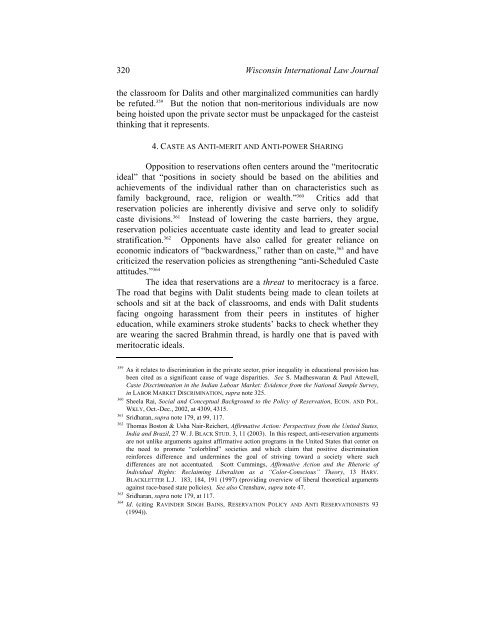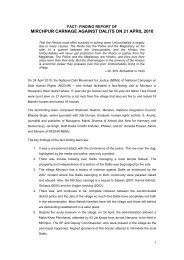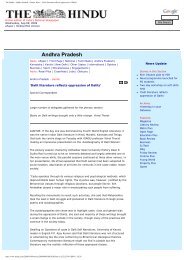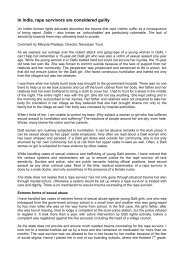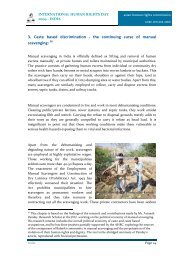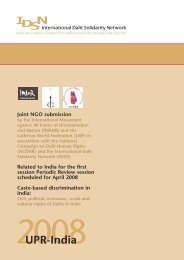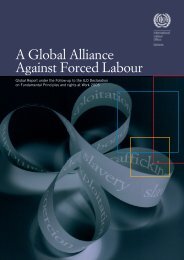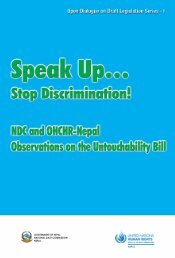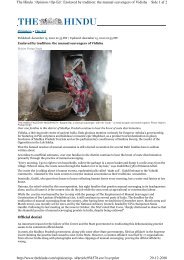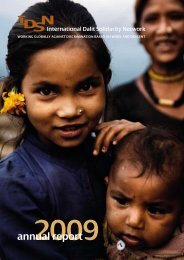320 Wisconsin <strong>International</strong> Law Journalthe classroom for <strong>Dalit</strong>s and other marginalized communities can hardlybe refuted. 359 But the notion that non-meritorious individuals are nowbeing hoisted upon the private sector must be unpackaged for the <strong>caste</strong>istthinking that it represents.4. CASTE AS ANTI-MERIT AND ANTI-POWER SHARINGOpposition to reservations often centers around the “meritocraticideal” that “positions in society should be based on the abilities andachievements of the individual rather than on characteristics such asfamily background, race, religion or wealth.” 360 Critics add thatreservation policies are inherently divisive and serve only to solidify<strong>caste</strong> divisions. 361 Instead of lowering the <strong>caste</strong> barriers, they argue,reservation policies accentuate <strong>caste</strong> identity and lead to greater socialstratification. 362 Opponents have also called for greater reliance oneconomic indicators of “backwardness,” rather than on <strong>caste</strong>, 363 and havecriticized the reservation policies as strengthening “anti-Scheduled Casteattitudes.” 364The idea that reservations are a threat to meritocracy is a farce.The road that begins with <strong>Dalit</strong> students being made to clean toilets atschools and sit at the back of classrooms, and ends with <strong>Dalit</strong> studentsfacing ongoing harassment from their peers in institutes of highereducation, while examiners stroke students’ backs to check whether theyare wearing the sacred Brahmin thread, is hardly one that is paved withmeritocratic ideals.359 As it relates to discrimination in the private sector, prior in<strong>equal</strong>ity in educational provision hasbeen cited as a significant cause of wage disparities. See S. Madheswaran & Paul Attewell,Caste Discrimination in the Indian Labour Market: Evidence from the National Sample Survey,in LABOR MARKET DISCRIMINATION, supra note 325.360 Sheela Rai, Social and Conceptual Background to the Policy of Reservation, ECON. AND POL.WKLY, Oct.-Dec., 2002, at 4309, 4315.361 Sridharan, supra note 179, at 99, 117.362 Thomas Boston & Usha Nair-Reichert, Affirmative Action: Perspectives from the United States,India and Brazil, 27 W. J. BLACK STUD. 3, 11 (2003). In this respect, anti-reservation argumentsare not unlike arguments against affirmative action programs in the United States that center onthe need to promote “colorblind” societies and which claim that positive discriminationreinforces difference and undermines the goal of striving toward a society where suchdifferences are not accentuated. Scott Cummings, Affirmative Action and the Rhetoric ofIndividual Rights: Reclaiming Liberalism as a “Color-Conscious” Theory, 13 HARV.BLACKLETTER L.J. 183, 184, 191 (1997) (providing overview of liberal theoretical argumentsagainst race-based state policies). See also Crenshaw, supra note 47.363 Sridharan, supra note 179, at 117.364 Id. (citing RAVINDER SINGH BAINS, RESERVATION POLICY AND ANTI RESERVATIONISTS 93(1994)).
Vol. 26, No. 2 Equal <strong>by</strong> Law, Un<strong>equal</strong> <strong>by</strong> Caste 321The <strong>caste</strong> system is <strong>by</strong> its very nature antithetical to meritinasmuch as it assigns value on the basis of birth and not individualaptitude. 365 Similarly, hirings and promotions are dictated not just <strong>by</strong> theacademic credentials of particular candidates, but <strong>by</strong> the ability of thoseindividuals to effectively deploy <strong>caste</strong>-based networks that, as in thepublic administration, corrupt the ability of the private sector system tooperate neutrally.Moreover, if market efficiency is furthered <strong>by</strong> the freedom ofindividuals to develop their capacities to the point of choosing theiroccupations, then that very principle “is violated in the <strong>caste</strong> system in sofar as it involves an attempt to appoint tasks to individuals in advance,selected not on the basis of trained original capacities, but on that of thesocial status of [his or her] parents.” 366 And what could be moreinefficient than the denial of opportunity to individuals, in the millions,who are told from birth to death that they will never amount to more thanthat which has been previously ordained for them? As an economicorganization, “<strong>caste</strong> is therefore a harmful institution, in as much as itinvolves the subordination of man’s natural powers and inclinations tothe exigencies of social rules.” 367 By denying so many the freedom tochoose their profession, <strong>caste</strong> also becomes “a direct cause of much ofthe unemployment we see in the country.” 368Reservations or quotas are critiqued for their inflexibility, but therigidity of the <strong>caste</strong> system, against which more fluid options find notraction, does not get scrutinized. Timeframes for bringing reservationsto an end are proposed as though giving legal remedies a deadline willautomatically lead to discrimination’s time-bound demise.Reservations as a form of power sharing in India take on newsignificance given that the <strong>caste</strong> system is organized around the idea ofpower consolidation and is, in its division of labor according to <strong>caste</strong>,antithetical to the very notion of a meritocracy. The absence of choice inemployment is also quite stark in the Indian context wherein one’s <strong>caste</strong>,or more specifically one’s membership in an “untouchable” <strong>caste</strong>,remains determinative of one’s occupation. <strong>Dalit</strong>s throughout India areforced into an involuntary monopoly over occupations considered toofilthy or polluting for others, occupations over which they ironically365 Gail Omvedt, Mythologies of Merit, in RESERVATION IN PRIVATE SECTOR, supra note 158, at203, 206.366 AMBEDKAR THOUGHT, supra note 19, at 26.367 Id. at 55.368 Id.
- Page 1 and 2:
EQUAL BY LAW, UNEQUAL BY CASTE: THE
- Page 3 and 4:
Vol. 26, No. 2 Equal by Law, Unequa
- Page 5 and 6:
Vol. 26, No. 2 Equal by Law, Unequa
- Page 7 and 8:
Vol. 26, No. 2 Equal by Law, Unequa
- Page 9 and 10:
Vol. 26, No. 2 Equal by Law, Unequa
- Page 11 and 12:
Vol. 26, No. 2 Equal by Law, Unequa
- Page 13 and 14:
Vol. 26, No. 2 Equal by Law, Unequa
- Page 15 and 16: Vol. 26, No. 2 Equal by Law, Unequa
- Page 17 and 18: Vol. 26, No. 2 Equal by Law, Unequa
- Page 19 and 20: Vol. 26, No. 2 Equal by Law, Unequa
- Page 21 and 22: Vol. 26, No. 2 Equal by Law, Unequa
- Page 23 and 24: Vol. 26, No. 2 Equal by Law, Unequa
- Page 25 and 26: Vol. 26, No. 2 Equal by Law, Unequa
- Page 27 and 28: Vol. 26, No. 2 Equal by Law, Unequa
- Page 29 and 30: Vol. 26, No. 2 Equal by Law, Unequa
- Page 31 and 32: Vol. 26, No. 2 Equal by Law, Unequa
- Page 33 and 34: Vol. 26, No. 2 Equal by Law, Unequa
- Page 35 and 36: Vol. 26, No. 2 Equal by Law, Unequa
- Page 37 and 38: Vol. 26, No. 2 Equal by Law, Unequa
- Page 39 and 40: Vol. 26, No. 2 Equal by Law, Unequa
- Page 41 and 42: Vol. 26, No. 2 Equal by Law, Unequa
- Page 43 and 44: Vol. 26, No. 2 Equal by Law, Unequa
- Page 45 and 46: Vol. 26, No. 2 Equal by Law, Unequa
- Page 47 and 48: Vol. 26, No. 2 Equal by Law, Unequa
- Page 49 and 50: Vol. 26, No. 2 Equal by Law, Unequa
- Page 51 and 52: Vol. 26, No. 2 Equal by Law, Unequa
- Page 53 and 54: Vol. 26, No. 2 Equal by Law, Unequa
- Page 55: Vol. 26, No. 2 Equal by Law, Unequa
- Page 58 and 59: 312 Wisconsin International Law Jou
- Page 60 and 61: 314 Wisconsin International Law Jou
- Page 62 and 63: 316 Wisconsin International Law Jou
- Page 64 and 65: 318 Wisconsin International Law Jou
- Page 68 and 69: 322 Wisconsin International Law Jou
- Page 70 and 71: 324 Wisconsin International Law Jou
- Page 72 and 73: 326 Wisconsin International Law Jou
- Page 74 and 75: 328 Wisconsin International Law Jou
- Page 76 and 77: 330 Wisconsin International Law Jou
- Page 78 and 79: 332 Wisconsin International Law Jou
- Page 80 and 81: 334 Wisconsin International Law Jou
- Page 82 and 83: 336 Wisconsin International Law Jou
- Page 84 and 85: 338 Wisconsin International Law Jou
- Page 86 and 87: 340 Wisconsin International Law Jou
- Page 88 and 89: 342 Wisconsin International Law Jou


